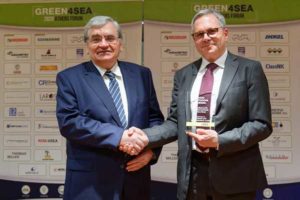WLPGA receives award for promoting LPG as marine fuel

Constantine Markakis, president and CEO of Dorian LPG Management, left, presents the Green4Sea Initiative Award to Nikos Xydas, technical director of the World LPG Association. (Photo: World LPG Association)
The World LPG Association (WLPGA) received the Green4Sea Initiative Award on March 3 in Athens, Greece.
Constantine Markakis, president and CEO of Dorian LPG Management in Athens, presented the award to WLPGA Technical Director Nikos Xydas during Green4Sea’s annual conference.
The Green4Sea awards recognize significant contributions to greener shipping. The Initiative Award recognizes WLPGA’s efforts in promoting LPG as a marine fuel and its report “LPG Bunkering, Guide for LPG Marine Fuel Supply.”
The report offers guidance on LPG marine fuel supply and aims to improve understanding in the maritime industry regarding bunkering ships with LPG. It concludes that the potential infrastructure for distribution of LPG is available to serve the potential marine market demand.
The report highlights that LPG is becoming the preferred fueling solution for carriers. Twenty-six very large gas carriers are being built or retrofitted to use LPG as a fuel. The first vessels will begin operating in 2020.
LPG addresses the International Maritime Organization’s (IMO) sulfur regulation and enables IMO to reduce total annual greenhouse gas emissions from international shipping by at least 50 percent by 2050, the WLPGA says.
The marine industry is under pressure to comply with IMO 2020, which calls for the reduction of sulfur permitted in ships’ fuel oil, and align with the 2050 emissions strategy, and LPG is a viable solution. The WLPGA says LPG propulsion, starting with the LPG carrier sector, must grow beyond being seen as a niche fuel option in order to gain acceptance in the wider shipping sector.
According to the report, infrastructure for the distribution of LPG is available to serve potential marine market demand, unlike other alternative fuels for which infrastructure is currently underdeveloped. LPG engine technology is available for a wide range of power outputs and requires lower capital expenditures compared to other alternatives.
Economic incentives and performance examples of the first vessels in operation will attract more ship owners and operators to invest in LPG-fueled fleets, the WLPGA says. Using dual-fuel engines allows operators to use LPG or compliant fuel.
The report claims that the necessary infrastructure is already in place for bunkering with LPG anywhere in the world. Supplies are abundant, especially due to increased production coming from the U.S.
















